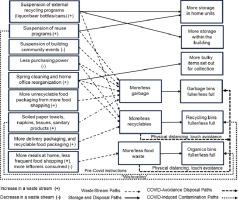Resources, Conservation and Recycling ( IF 11.2 ) Pub Date : 2020-08-19 , DOI: 10.1016/j.resconrec.2020.105111 Ece Ikiz 1 , Virginia W Maclaren 1 , Emily Alfred 2 , Sayan Sivanesan 2

|
The COVID-19 pandemic has had numerous environmental consequences, including impacts on municipal waste management systems. Changes in consumption and waste disposal patterns and behaviours during the lockdown period have produced new challenges for solid waste management and waste diversion activities. This paper develops a conceptual model that reflects short-term changes in waste flows from households that are due to COVID-19 disruptions, focusing on the case of multi-residential buildings in Toronto, Canada. Multi-residential buildings are of interest because they differ from single family homes in several key ways that can produce some slightly different impacts of COVID-19 on waste flows and practices. Primary research for the study included interviews with 19 staff, residents and property managers of ten multi-residential buildings. All of the research took place while Toronto was still in partial-lockdown. Analysis of the interviews revealed five themes around the impact of COVID-19: (1) changes in garbage, recycling and organics flows, (2) new health and safety concerns, (3) changes in reuse and reduction practices, (4) changes in special waste and deposit-return bottle collections, and (5) changes in waste diversion and reduction education. Given the time frame of our study, we recognize these as short-term impacts and call for future research to determine how many of the changes are likely to perpetuate over the medium and longer term.
中文翻译:

COVID-19对家庭废物流,转移和再利用的影响:以加拿大多伦多的多住宅建筑为例。
COVID-19大流行对环境造成了许多影响,包括对市政废物管理系统的影响。锁定期间消费和废物处置方式和行为的变化给固体废物管理和废物转移活动提出了新的挑战。本文建立了一个概念模型,该模型反映了由于COVID-19干扰而导致的家庭废物流量的短期变化,重点是加拿大多伦多的多住宅建筑。多住宅建筑物之所以引起人们的兴趣,是因为它们与单户住宅的不同之处在于几个关键方面,这些方面可能会产生COVID-19对废物流和做法的轻微影响。该研究的主要研究包括对10栋多住宅建筑物的19名员工,居民和物业经理的采访。所有研究都是在多伦多仍处于部分锁定状态时进行的。对访谈的分析揭示了围绕COVID-19的影响的五个主题:(1)垃圾,回收利用和有机物流量的变化;(2)新的健康与安全问题;(3)重复利用和减少做法的变化;(4)变化(5)改变废物转移和减少教育的方式。在我们研究的时间框架内,我们将其视为短期影响,并呼吁未来的研究来确定在中长期内可能会发生多少变化。(3)改变重复利用和减少做法,(4)改变特殊废物和沉淀物回收瓶的收集方式,(5)改变废物转移和减少教育方式。在我们研究的时间框架内,我们将其视为短期影响,并呼吁未来的研究来确定在中长期内可能会发生多少变化。(3)改变重复利用和减少做法,(4)改变特殊废物和沉淀物回收瓶的收集,以及(5)改变废物转移和减少教育的方式。在我们研究的时间框架内,我们将其视为短期影响,并呼吁未来的研究来确定在中长期内可能会发生多少变化。











































 京公网安备 11010802027423号
京公网安备 11010802027423号